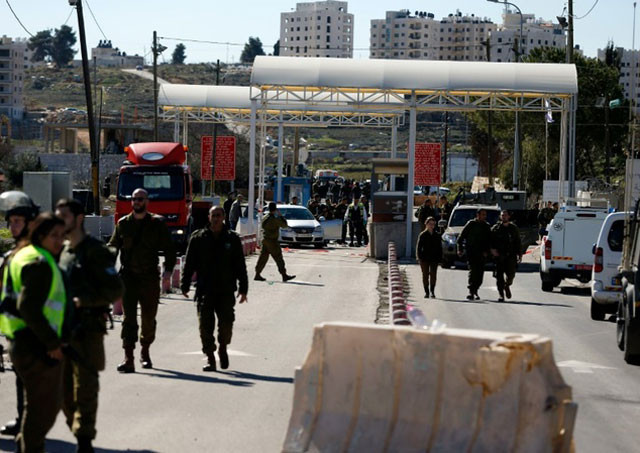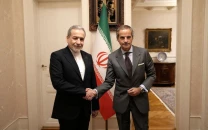Israel blocks non-residents from Ramallah after attack
Sources say unusual move also applied to foreigners, although UN, INGOs and diplomatic staff were being allowed in

Israeli security forces gather at the scene of a reported Palestinian shooting attack at a checkpoint near the Beit El settlement, close to West Bank city of Ramallah, on January 31, 2016. PHOTO: AFP
The unusual move also applied to foreigners, although United Nations officials, international NGOs and diplomatic staff were being allowed in, diplomatic and UN sources said. Palestinians seeking to leave Ramallah were also undergoing security checks, leading to frustration in lengthy queues.
"In accordance with situation assessments following yesterday's shooting attack in Beit El, security measures have been taken in the area and only residents of Ramallah are allowed to enter the city," a military spokesperson said.
Sunday's attack saw a Palestinian who had worked as a guard for the attorney general's office in Ramallah open fire at a checkpoint outside the city, wounding three Israeli soldiers before being shot dead.
It was the latest in four months of Palestinian knife, gun and car-ramming attacks targeting Israelis. Most of the attacks have been stabbings, though shootings have occasionally occurred. The military spokesperson said on Monday a decision on when to lift the measure would depend on security assessments, with Israel seeking to halt the wave of attacks.
It was not clear when the last time such a move had been taken by Israel, though heavy restrictions were put in place during the second Palestinian intifada, or uprising, between 2000 and 2005.
Sunday's shooting marked at least the second time a Palestinian security officer had been implicated in an attack in the current wave of violence. The checkpoint where it occurred, regularly used by diplomats, journalists and humanitarian workers, was closed on Monday morning, an AFP journalist reported.
A number of other roads connecting Ramallah with the northern West Bank were also closed or restricted, although checkpoints near Jerusalem were open. Later in the day, it appeared that enforcement of the measure varied between locations.
A large number of Palestinians, aid workers and diplomats commute to Ramallah for work or other reasons on a daily basis. While diplomats were not directly impacted, "the travel restriction on Palestinians is having an effect in terms of our ability to engage", one Western diplomat said.
"A number of meetings have been called off because Palestinian interlocutors have not been able to get to the meeting site." Palestinians queueing to leave Ramallah said they considered the measure to be punishment for Sunday's attack.
One woman in her 30s waiting in a taxi gave her name as Aline and said she was missing a court date in Nablus in the northern West Bank. "The question is until when this will happen?" she asked.
"Every time someone has a gun and goes to shoot the Israeli army? Neither the (Palestinian) president is harmed or anyone else. Only the people are harmed."
Violence since October has killed 25 Israelis, as well as an American and an Eritrean, according to an AFP count. At the same time, 161 Palestinians have been killed by Israeli forces, most while carrying out attacks but others during clashes and demonstrations. The checkpoint shooting was one of two attacks on Sunday.
Later in the day, an attempted car-ramming occurred at a military checkpoint in the West Bank north of Jerusalem, with the attacker shot and taken to hospital for treatment, Israel's military said. No Israelis were reported wounded.
On Monday morning, a 17-year-old Palestinian was shot dead after trying to stab soldiers near the Jewish settlement of Salit in the West Bank, Israel's army said. Salit is near Israeli territory, not far from Tel Aviv.
Some analysts say Palestinian frustration with Israel's occupation of the West Bank, the complete lack of progress in peace efforts and their own fractured leadership have helped feed the unrest.
Israel blames incitement by Palestinian leaders and media as a main cause of the violence. Many of the attackers have been young people, including teenagers, who appear to have been acting on their own.



















COMMENTS
Comments are moderated and generally will be posted if they are on-topic and not abusive.
For more information, please see our Comments FAQ